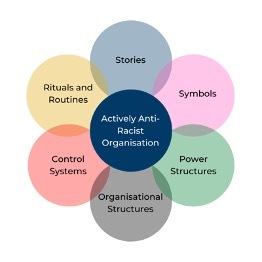We’ve talked about anti-racism and allyship; what next? Over the past year, I have learnt a lot speaking to aspiring allies, including IEMA and its members. I have listened to their ambitions, concerns, questions, stories, and careful reflections. I have been heartened by how people used the space to share ideas and support one another. Over the past few months, I have been running workshops to help individuals and organisations identify how they can be better allies, including one for IEMA staff that we’re hoping to roll out to a wider audience. In these ‘Making Sense of Allyship’ sessions, we introduced and explored concepts for further reflection, about people’s lived experiences, battle fatigue and the options we have as allies.
But, what is next, now that we are starting to understand the theory and terminology of allyship? Allyship is not a noun, but a verb. It is something that we do, rather than a status. It is adopting the mindset and commitment to learn more about the experiences outside of our own, to appreciate and celebrate our colleagues, clients, and stakeholders, now and in the future. It is to courageously, curiously, and compassionately challenge individuals and structures that inhibit or suppress the expressions and contributions of its community. These sessions were focused on the micro-level, where we have direct power – ourselves. And I hope to see some of you in future sessions. However, in this article, I want to explore how we start to address the institutional aspects that contribute to the marginalisation of some of our communities.
But where are you really from?
Before we start to look at implementing changes, updating policies and strategies, or reactively knee-jerking to be seen to do something, stop. Unconscious bias training or removing names from application forms can be a good start, but on its own, is not going to fix racist, homophobic, transphobic, ageist, ableist or misogynist thoughts or behaviours. Sharing best practice and examining examples that work in other organisations is also a good place to start. But it doesn’t mean that simply replicating that best practice will work inside your organisation. Doing what everyone else is doing might not work for you and the communities you work with. Just because someone gives you a map doesn’t mean it will immediately work for you and get you to where you want to go. To successfully use a map (or learn from the best practice of others) we must first determine where we are. We might find it helpful to identify where we have already been, tracing our steps of how we got to where we are.
Organisationally, you might have the statistical data: the demographic breakdown of our colleagues and stakeholders; information about our key users and clients; who views our website and where from; and who accesses the various services and products on offer. You have feedback on your programmes, events, services, processes, and performances. It is a good start. But what does that actually tell you about the people who make up your community and culture? Adapting Johnson, Whittington, and Scholes’s tool (2012)[1], I argue that the Cultural Web offers a strategic framework for organisational reflection.
The Cultural Web explores six areas that collectively comprise your work environment, both how your organisational culture manifests within formal structures and informal settings. It can be used to look at where your culture is now and where you want it to be in the future by working through questions in each of the six areas.
If we accept that culture is fluid, ever-changing and adapting, made up of different sub-cultures, then the stories we share fill the capillaries of our organisations. What are the stories that are told and shared between stakeholders and sub-groups? How do they shape and reinforce your formal and informal rituals and routines? Are those impacted by the power structures, control systems and organisational structures? What symbols manifest as a result, and how might they enable or disable members of your community?
I am aware that reflection on this scale is a big ask. The challenge is to be open to hearing those stories that you might not believe exist in your eco-system, which can also challenge your own worldview and experiences. This process might require openness, compassion, and resilience at a higher level of discomfort than you are used to. Organisationally and individually, we will be made aware of our own blind-spots, failings, and burden of responsibilities that come from our raised awareness of our different privileges (we all have them!). It won’t be easy; it won’t be quick – but I promise you it will be worth it. We can’t change institutional and historical injustices, discrimination, or inequalities overnight. In lieu of that, invest in meaningful and effective change by starting at the beginning and unpicking your culture before working out how to solve it
By taking the time to reflect on these questions and systematically evaluate what makes you the organisation that you are, you can begin to reorientate where you are on the map and plan an effective route that works for your own terrain and the resources you have readily-to-hand. Of course, you are not alone in this. There are many of you embarking on this journey and will naturally cross paths so please do continue the generous collaborations that I have witnessed over these few months. While the journey in each organisation is unique, we can share the challenge collectively and draw upon each other’s strengths to make the necessary changes. I have so much admiration for and confidence in those of you who I’ve spoken with so far; the very best of luck!
Lou is a culture and relationships coach and consultant who specialises in cultural wellness and developing individual and organisational allies, and always happy to help.
Website: louchiu.com
Email: hello@louchiu.com
[1] Johnson, G., Whittington, R. and Scholes, K. (2015) Fundamentals of strategy. Third edn. Harlow, England: Pearson.


